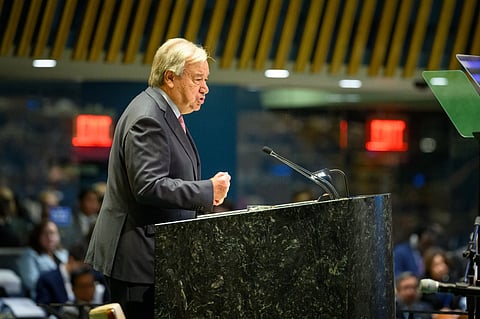

The United Nations is in need for a complete overhaul as it was established eight decades ago, UN Secretary-General Antonio Guterres acknowledged in his opening remarks to the Summit of the Future on September 22, 2024.
When the UN was established nearly 80 years ago, it had 51 Member States. This number is now 193, Guterres noted.
The global economy was less than one-twelfth of its current size. The international financial architecture was established when many of today’s developing countries were under colonial rule.
“It does not represent the realities of today’s global economy, and it is no longer able to resolve global economic challenges: debt, climate action, sustainable development. It does not provide the global safety net that developing countries need,” said the Secretary-General.
In the meanwhile, technology, geopolitics and globalisation have transformed power relations, with the world going through a time of turbulence and a period of transition.
Huge inequalities are a brake on sustainable development. Many developing countries are drowning in debt and unable to support their people, Guterres observed.
All this means that the tools and institutions that were created at the end of World War II for peace, security and global finance reflect a bygone era.
“The United Nations Security Council is outdated, and its authority is eroding. Unless its composition and working methods are reformed, it will eventually lose all credibility,” said the UN chief.
Guterres said the world cannot wait for what he termed ‘perfect conditions’: “We must take the first decisive steps towards updating and reforming international cooperation and make it more networked, fair and inclusive — now.”
The Pact for the Future, the Global Digital Compact and the Declaration on Future Generations open pathways to new possibilities and opportunities, he added.
This was because they promise a breakthrough on reforms to make the Security Council more reflective of today’s world, addressing the historic under-representation of Africa, Asia-Pacific, and Latin America.
They also lay the foundations for a more agile Peacebuilding Commission, and for a fundamental review of peace operations to make them fit for the conditions they face, said the Secretary-General.
The three agreements represent the first agreed multilateral support for nuclear disarmament in more than a decade. They recognise the changing nature of conflict, and commit to steps to prevent an arms race in outer space and to govern the use of lethal autonomous weapons.
The agreements also represent major progress towards groundbreaking reforms of the international financial architecture and thus lay the foundation for sustainable development.
“They will help to make its institutions more representative of today’s world, capable of mounting a stronger response to today’s challenges, and able to provide an effective global safety net for developing countries at a time when many of them are suffocating in debt and unable to make progress on the Sustainable Development Goals (SDGs),” said Guterres.
He noted that the Pact for the Future is about ‘turbocharging’ the SDGs and the Paris Agreement, accelerating a just transition away from fossil fuels, and securing a peaceful and livable future for everyone on the planet.
The Pact includes a commitment by governments to listen to young people and include them in decision-making, at the national and global levels. It commits to stronger partnerships with civil society, the private sector, local and regional authorities and more.
The Global Digital Compact, said Guterres, is based on the principle that technology should benefit everyone. It includes the first truly universal agreement on the international governance of Artificial Intelligence.
The Compact commits governments to establishing an independent international Scientific Panel on AI and initiating a global dialogue on its governance within the United Nations.
“The Declaration on Future Generations echoes the call of the United Nations Charter to save succeeding generations from the scourge of war, committing governments for the first time to taking the interests of our descendants into account in decisions we take today. Respect for human rights, cultural diversity and gender equality are woven into all three agreements,” said the UN head.
He stated that he welcomed the three landmark agreements which were a step-change towards more effective, inclusive, networked multilateralism.
“The Summit of the Future sets a course for international cooperation that can meet their expectations,” said Guterres.